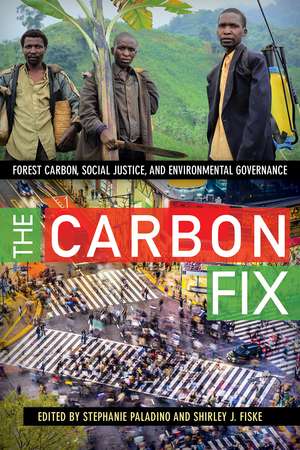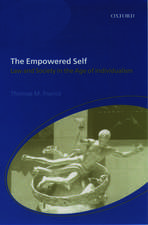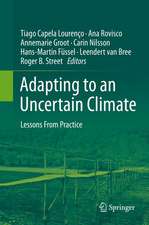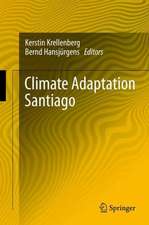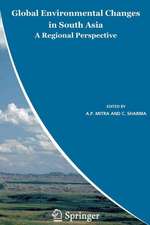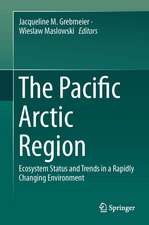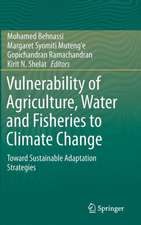The Carbon Fix: Forest Carbon, Social Justice, and Environmental Governance
Editat de Stephanie Paladino, Shirley J Fiskeen Limba Engleză Paperback – 15 noi 2016
Contributions from leading anthropologists and geographers analyze a growing trend towards market principles and financialization of nature in environmental governance, placing it into conceptual, critical, and historical context. The book then challenges perceptions of forest carbon initiatives through in-depth, field-based case studies assessing projects, policies, and procedures at various scales, from informed consent to international carbon auditing. While providing a mixed assessment of the potential for forest carbon initiatives to balance carbon with social goals, the authors present compelling evidence for the complexities of the carbon offset enterprise, fraught with competing interests and interpretations at multiple scales, and having unanticipated and often deleterious effects on the resources and rights of the world’s poorest peoples—especially indigenous and rural peoples.
The Carbon Fix provides nuanced insights into political, economic, and ethical issues associated with climate change policy. Its case approach and fresh perspective are critical to environmental professionals, development planners, and project managers; and to students in upper level undergraduate and graduate courses in environmental anthropology and geography, environmental and policy studies, international development, and indigenous studies.
| Toate formatele și edițiile | Preț | Express |
|---|---|---|
| Paperback (1) | 451.32 lei 6-8 săpt. | |
| Taylor & Francis – 15 noi 2016 | 451.32 lei 6-8 săpt. | |
| Hardback (1) | 1005.80 lei 6-8 săpt. | |
| Taylor & Francis – 10 noi 2016 | 1005.80 lei 6-8 săpt. |
Preț: 451.32 lei
Nou
Puncte Express: 677
Preț estimativ în valută:
86.37€ • 89.84$ • 71.30£
86.37€ • 89.84$ • 71.30£
Carte tipărită la comandă
Livrare economică 12-26 aprilie
Preluare comenzi: 021 569.72.76
Specificații
ISBN-13: 9781611323337
ISBN-10: 1611323339
Pagini: 356
Ilustrații: 30 illustrations, appendixes, notes, references, index
Dimensiuni: 152 x 229 x 24 mm
Greutate: 0.5 kg
Ediția:1
Editura: Taylor & Francis
Colecția Routledge
Locul publicării:Oxford, United Kingdom
ISBN-10: 1611323339
Pagini: 356
Ilustrații: 30 illustrations, appendixes, notes, references, index
Dimensiuni: 152 x 229 x 24 mm
Greutate: 0.5 kg
Ediția:1
Editura: Taylor & Francis
Colecția Routledge
Locul publicării:Oxford, United Kingdom
Public țintă
UndergraduateCuprins
FOREWORD
The Carbon Offsetting Dilemma
Esteve Corbera
INTRODUCTION
Carbon Offset, Markets, and Social Equity: Trading in Forests to Save the Planet
Shirley J. Fiske and Stephanie Paladino
SECTION I: FRAMING THE CARBON REGIME IN THE CONTEXT OF GLOBAL TRENDS
1. A Genealogy of Exchangeable Nature
James Igoe
2. Profits and Promises: Can Carbon Trading Save Forests and Aid Development?
Kathleen McAfee
3. Forest Carbon Sinks Prior to REDD: A Brief History of their Role in the Clean Development Mechanism
María Gutiérrez
4. Justice and Equity in Carbon Offset Governance: Debates and Dilemmas
Mary Finley-Brook
SECTION II: ACCOUNTING AND ACCOUNTABILITY
5. The Limitations of International Auditing: The Case of the Norway-Guyana REDD+ Agreement
Janette Bulkan
6. Corporate Carbon Footprinting as Techno-political Practice
Ingmar Lippert
7. Regulating Fairness in the Design of California’s Cap-and-Trade Market
Patrick Bigger
SECTION III: NATIONAL AND SUBNATIONAL FRAMINGS
8. Carbon, Carbon Everywhere: How Climate Change is Transforming Conservation in Costa Rica
Robert Fletcher
9. Customary Landowners, Logging Companies, and Conservationists in a Decentralized State: The Case of REDD+ and PES in Papua New Guinea
David Lipset and Bridget Henning
10. Interrogating Public Debates over Jurisdictional REDD+ in California’s Global Warming Solutions Act: Implications for Social Equity
Libby Blanchard and Bhaskar Vira
11. Doing REDD+ Work in Vietnam: Will the New Carbon Focus Bring Equity to Forest Management?
Pamela McElwee
SECTION IV: REDD, RIGHTS, AND EQUITY
12. Renegotiating REDD: Beyond Social Safeguards to Social Contracts
Michael Brown
13. A Win-Win Scenario? The Prospects for Indigenous Peoples in Carbon Sequestration: REDD Projects in Brazil
Janet Chernela and Laura Zanotti
14. Equity Concerns During REDD+ Planning and Early Implementation:
A Case from Malawi
Heather Yocum
15. Lessons from Community Forestry for REDD+ Social Soundness
Janis B. Alcorn
SECTION V: ALTERNATIVE CONFIGURATIONS OF COMMUNITY AND GOVERNANCE
16. Empowering Forest Dependent Communities: The Role of REDD+ and PES Projects
Mark Poffenberger
17. Climate Mitigation Based in Adaptation: El Salvador's Restoration of Mangrove Ecosystems, 2011-2013
Fiona Wilmot
18. A Critical Reflection on Social Equity in Ugandan Carbon Forestry
Adrian Nel
The Carbon Offsetting Dilemma
Esteve Corbera
INTRODUCTION
Carbon Offset, Markets, and Social Equity: Trading in Forests to Save the Planet
Shirley J. Fiske and Stephanie Paladino
SECTION I: FRAMING THE CARBON REGIME IN THE CONTEXT OF GLOBAL TRENDS
1. A Genealogy of Exchangeable Nature
James Igoe
2. Profits and Promises: Can Carbon Trading Save Forests and Aid Development?
Kathleen McAfee
3. Forest Carbon Sinks Prior to REDD: A Brief History of their Role in the Clean Development Mechanism
María Gutiérrez
4. Justice and Equity in Carbon Offset Governance: Debates and Dilemmas
Mary Finley-Brook
SECTION II: ACCOUNTING AND ACCOUNTABILITY
5. The Limitations of International Auditing: The Case of the Norway-Guyana REDD+ Agreement
Janette Bulkan
6. Corporate Carbon Footprinting as Techno-political Practice
Ingmar Lippert
7. Regulating Fairness in the Design of California’s Cap-and-Trade Market
Patrick Bigger
SECTION III: NATIONAL AND SUBNATIONAL FRAMINGS
8. Carbon, Carbon Everywhere: How Climate Change is Transforming Conservation in Costa Rica
Robert Fletcher
9. Customary Landowners, Logging Companies, and Conservationists in a Decentralized State: The Case of REDD+ and PES in Papua New Guinea
David Lipset and Bridget Henning
10. Interrogating Public Debates over Jurisdictional REDD+ in California’s Global Warming Solutions Act: Implications for Social Equity
Libby Blanchard and Bhaskar Vira
11. Doing REDD+ Work in Vietnam: Will the New Carbon Focus Bring Equity to Forest Management?
Pamela McElwee
SECTION IV: REDD, RIGHTS, AND EQUITY
12. Renegotiating REDD: Beyond Social Safeguards to Social Contracts
Michael Brown
13. A Win-Win Scenario? The Prospects for Indigenous Peoples in Carbon Sequestration: REDD Projects in Brazil
Janet Chernela and Laura Zanotti
14. Equity Concerns During REDD+ Planning and Early Implementation:
A Case from Malawi
Heather Yocum
15. Lessons from Community Forestry for REDD+ Social Soundness
Janis B. Alcorn
SECTION V: ALTERNATIVE CONFIGURATIONS OF COMMUNITY AND GOVERNANCE
16. Empowering Forest Dependent Communities: The Role of REDD+ and PES Projects
Mark Poffenberger
17. Climate Mitigation Based in Adaptation: El Salvador's Restoration of Mangrove Ecosystems, 2011-2013
Fiona Wilmot
18. A Critical Reflection on Social Equity in Ugandan Carbon Forestry
Adrian Nel
Recenzii
“The Carbon Fix provides a much-needed update on the world of REDD+ (Reduced Emissions from Deforestation and Forest Degradation) globally. Only now are studies of actual impacts beginning to emerge. This collection provides timely assessments of the impacts of REDD+ in its current incarnation. The authors identify the advantages and disadvantages of the various approaches and mechanisms, offer a number of practical suggestions for better future implementation of REDD+, and provide practical warnings about things that can go awry. This collection, something of a cautionary tale, contributes significantly to efforts to mitigate climate change.” Carol J. Pierce Colfer, Center for International Forestry Research, Bogor, Indonesia
"Climate Change is a ‘wicked’ problem for which there are no simple answers. REDD and REDD+ approaches have been touted as win-win strategies for making headway toward a lower carbon world, but the complex problems with the implementation of these tools have not--until now-- received the critical attention needed to determine if and how they might achieve their purpose. The Carbon Fix is a very important book and essential reading for policymakers, students, and interdisciplinary scholars concerned about effective ways to combat climate change in the real world, as it forces us all to consider the significant social justice issues that surround these new accounting processes." Sarah Strauss, University of Wyoming
"This book, compiled by Stephanie Paladino and Shirley J. Fiske, is an important addition to the REDD+ literature. The carefully reviewed chapters in a coherent manner depict the work experience of the editors and authors in a coherent manner. The book has 19 chapters divided into five sections. Most of the chapters authors are anthropologists by profession; and their contribution emphasizes the societal implications of carbon offsetting."
S. Suresh Ramanan, writing for Agriculture and Human Values
"Climate Change is a ‘wicked’ problem for which there are no simple answers. REDD and REDD+ approaches have been touted as win-win strategies for making headway toward a lower carbon world, but the complex problems with the implementation of these tools have not--until now-- received the critical attention needed to determine if and how they might achieve their purpose. The Carbon Fix is a very important book and essential reading for policymakers, students, and interdisciplinary scholars concerned about effective ways to combat climate change in the real world, as it forces us all to consider the significant social justice issues that surround these new accounting processes." Sarah Strauss, University of Wyoming
"This book, compiled by Stephanie Paladino and Shirley J. Fiske, is an important addition to the REDD+ literature. The carefully reviewed chapters in a coherent manner depict the work experience of the editors and authors in a coherent manner. The book has 19 chapters divided into five sections. Most of the chapters authors are anthropologists by profession; and their contribution emphasizes the societal implications of carbon offsetting."
S. Suresh Ramanan, writing for Agriculture and Human Values
Descriere
Written by a diverse group of anthropologists, environmental researchers, environmentalists, and policy-makers, The Carbon Fix closely examines the current model for dealing with global warming—paying for carbon capture—and the negative effects this model has on rural communities, indigenous groups, and others in less developed regions who depend on or control carbon- sequestering lands.
